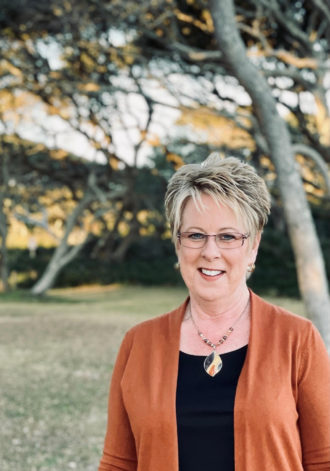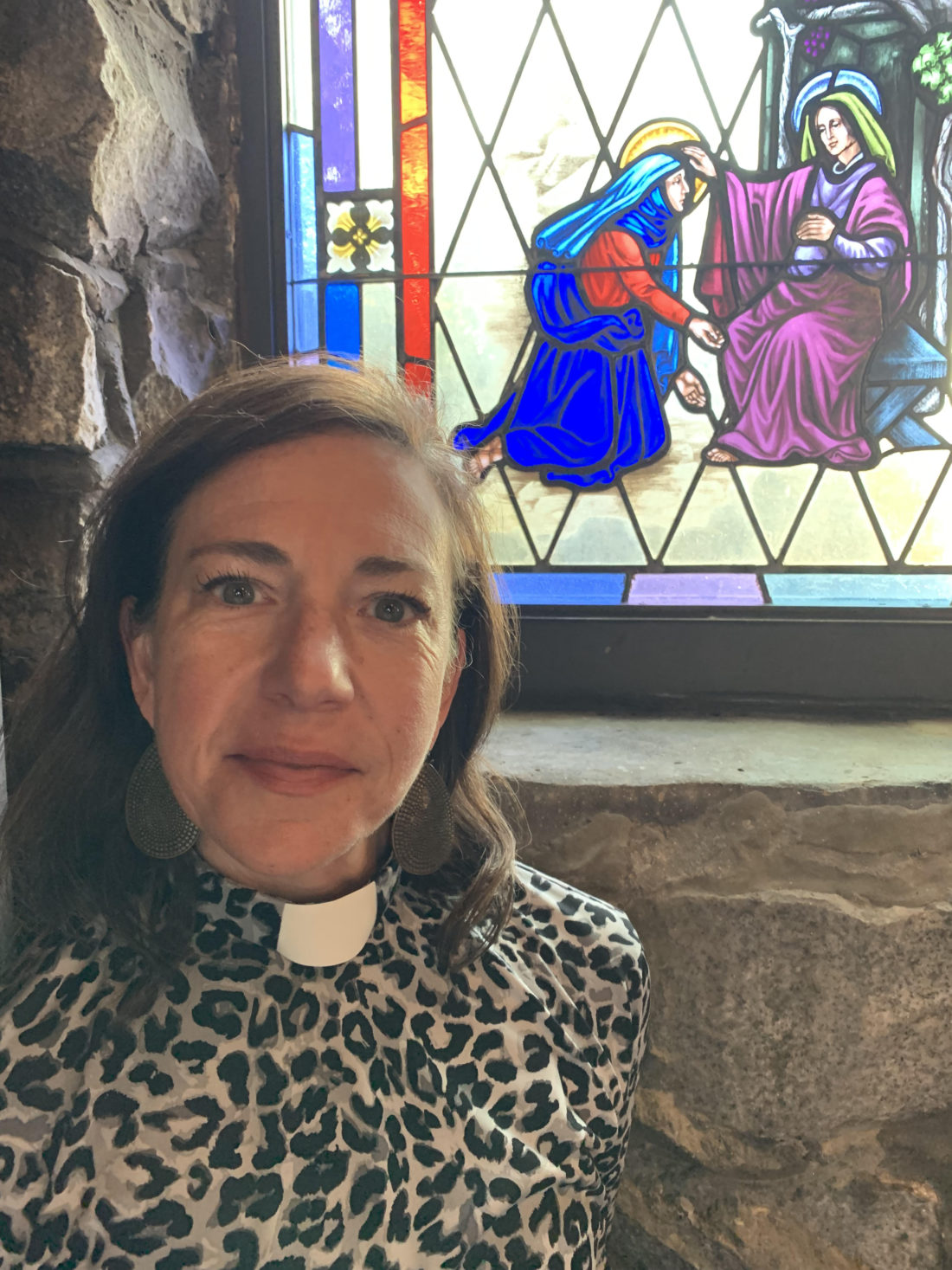“Our Father, who art in heaven,” goes the start of one of Christianity’s most popular prayers. “On earth as it is in heaven,” goes another line — and just as believers often envision a male figure at the head of the celestial hierarchy, so do they usually see a man in charge of their faith community. According to the most recent National Congregations Study, released last year by Duke University researchers, only 14% of all American congregations were led by women as of 2019.
While no such comprehensive data is available for Western North Carolina, Katherine Zubko, a professor of religious studies at UNC Asheville, says things are a bit different here. Because religious leadership reflects the society in which believers live, she says, it’s not unusual to find women leading congregations in Asheville, a place known for its liberal and progressive leanings.
For the Rev. Milly Morrow, the rector of Grace Episcopal Church in North Asheville, a female presence at the head of congregations is an invaluable counterweight to prevailing social trends. She sees the preponderance of men standing at pulpits across the country as indicative of the power of men in general — in churches and throughout every other aspect of society.
“The male-centered narrative is normative,” Morrow says. “Because of patriarchy and white supremacy in the world, it keeps male domination validated. Until that changes, it’s just the water we swim in.”
“If leaders lead with love, then gender is not important,” Morrow continues. “Gender is a social construct, and binary is an illusion created by the patriarchy. And if we are going to follow Jesus, we must work to deconstruct empires, whether in Rome, Egypt or America.”
Nothing personal
Darlene Strickland, the senior minister at Unity of the Blue Ridge in Mills River, says that God has been personified as a male figure for so long that it’s ingrained in the subconscious of many people. Even at Unity, which has traditionally attracted a diverse population, she’s seen biases.

Gender bias is a common issue in American culture, Strickland continues, “But I don’t see that it should be different at all when it comes to being a minister. It’s about helping people with their spirit if you have the gift.”
Unity congregant and board member Sharon Oxendine says she’d never planned on joining a church. But she was attracted by the message at Unity, a New Thought denomination that often refers to the higher power as “mother, father, God.”
“I don’t find it unusual to have a female minister,” says Oxendine, a Fletcher resident enrolled in the Lumbee Tribe of North Carolina. An ordained sacred pipe carrier and elder in the community, she says Native Americans come from a matriarchal society where women carry the medicine and make decisions. “My role is to serve. My ministry is to be of service in death, birth and marriage ceremonies and rituals.”
The Rev. Mike Reardon is associate rector at Grace Episcopal Church. “While I believe it wholly inaccurate that God is actually male, patriarchal distortions have abounded in the church’s theology and leadership over centuries,” he tells Xpress. “The problem is that people understandably equate the practices of the church and the realities of God.”
The son of a single mother, Reardon says he respects female faith leaders who continue to face discrimination. “I do know that it’s far more difficult to be a female leader in our church,” Reardon says. “Because of this, I tend to have deeper trust in the competency of female leaders. I know that they’ve had to overcome obstacles that their male counterparts have not, and that they have found themselves getting to leadership in spite of church tradition rather than through the support of it.”
Catching up
Progress in bringing women to the pulpit is also happening within the Jewish community, says Rabbi Batsheva Meiri of Congregation Beth HaTephila, a Reform Judaism synagogue in Asheville. “Even though it’s been slow, it’s definitely on the rise,” Meiri says. “Especially when you consider that the first female American rabbi wasn’t ordained until 1972, and Orthodox Jews still don’t have any female rabbis.”
Her University of Wisconsin Madison graduation class of 1991 Reform Jews was the first to have a 50/50 split of men and women. “I think the entrance of women clergy is a direct reflection of women in the country,” she says. “Women are taking their places in all areas of business.”
Meiri says there has been concern that with the feminization of the rabbinate, men would be alienated, “but that worry hasn’t come to fruition.” In her own congregation of more than 300 families, she says men and women all play key roles. To better reflect that diversity, one of her main projects is “changing the male-oriented language in our liturgy,” she says.
“I was much more aware of being a woman in a man’s world 25 or 30 years ago, when I first started doing this work,” says Meiri. “Now it’s not so surprising to people, so I don’t have to adjust. I just come as me. I don’t have to earn the pulpit every time I walk up to it.”
Meiri believes that women “bring a different flavor to the clerical role.” Her father in Baltimore is a rabbi who she says leads from “a position of authority and clear instruction that this is the way we do things.” She says the structures and expectations of female faith leaders tends to be more democratic and less hierarchal.
“It’s a type of personality that women bring into the room,” she says. “In Baltimore, everyone rose to his presence; it was very formal and reverent. I wouldn’t ever have the expectation that people would rise in my presence.”
Meiri agrees that religious organizations reflect the gender biases found throughout society in every corner of business. “Progressive religions can’t wall off changes in society. And changes may seem slow, but they are happening in all aspects of leadership.”
Change coming
While forward-thinking women are already willing to face stereotypes and biases in the name of service, the next generations may truly be the ones to shake up religious and spiritual communities, says UNCA’s Zubko. “If the students in UNCA’s religious studies classes are any indication of how the next generation views gender, they will definitely influence every area of leadership, including religion,” she says. “I think as society explores different identities generally, it will be reflected in religious leadership as well. I see it on the ground with students and their understanding of identity. It blows me away.”
Strickland from Unity likewise applauds the younger people driving changes and questioning the white supremacy and male patriarchy into which they’ve been born. “If anything [from women to ideas] has been suppressed or oppressed, it’s really just taking its rightful place” when change does come, she says. “And women are finding their voice and their place in leadership, even at the risk of being called a bitch.”
Ministry is a calling, she says, no matter who you are. “And people of all kinds are authentically showing up, seeking to serve a purpose bigger than they are.”
Reardon, himself a millennial, echoes that optimism. “I do have hope that our generation will do a better job of listening to the work of the spirit, and that our leadership and wider church will be reflective of the diversity of gender that exists in our world,” he says. “I hope that our generation changes a lot about the church. For too long, the church has played the role of gatekeeper rather than that of liberator. I have faith in God and know that God will work in our world and through the lives of many.”




An excellent article…” Gender is a social construct, and binary is an illusion created by the patriarchy. And if we are going to follow Jesus, we must work to deconstruct empires, whether in Rome, Egypt or America.” Well said by Rev. Morrow. Women comprise only 14% of ministers in the u.s. Men have had their chance, and have botched the job. Women have more of an investment in the future through their children, more empathy and more intellect than men. Do a fact check. Blessings on all women heading religious communities.
‘Men have had their chance, and have botched the job. Women have more of an investment in the future through their children, more empathy and more intellect than men.’
Might be better to say ‘Some men. Some women.’ Sweeping gender generalizations are dangerous and wrong. One could just as easily say that women have married and elected the wrong men, and that would be just as true (and/or false) and thus wrong…